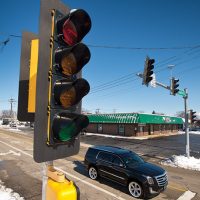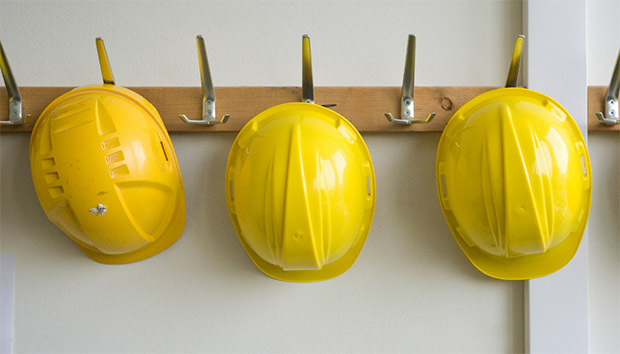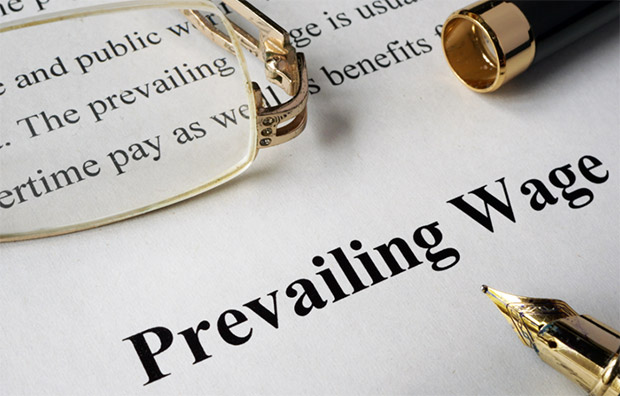State Supreme Court to decide government immunity dispute
By: Erika Strebel, [email protected]//March 20, 2017//
State Supreme Court to decide government immunity dispute
By: Erika Strebel, [email protected]//March 20, 2017//

The Wisconsin Supreme Court will be weighing in on a case that could clarify when immunity kicks in for contractors working on a government project.
The case, Melchert v. Pro Electric, stems from Pro Electric’s installation in August 2012 of a concrete base for a new traffic light in Brookfield. Pro Electric was a subcontractor of Payne & Dolan, a Waukesha paving contractor.
After the work was completed, the owners and tenants of a nearby property — including Dr. Randall Melchert, an eye doctor who rented space there for his clinic — reported water damage.
Melchert filed suit, alleging that Pro Electric had severed a sewer lateral while using a circular auger to dig a hole to set the base of a nearby traffic light.
Melchert contended that the work had caused flooding and damage to the property he was leasing and alleged that Pro Electric was liable for that damage.
Saul Glazer, a lawyer at Axley Brynelson in Madison, said he was surprised the Wisconsin Supreme Court accepted Melchert’s petition for review because it seemed like a straightforward case concerning immunity for a government contractor.
“Maybe the Wisconsin Supreme Court is looking for a way to make it more black and white,” he said. “Pro Electric won, but it still had to litigate the thing.”
Both a circuit court and appeals court had ruled in Pro Electric’s favor, granting the contractor’s motion for summary judgment. The circuit court found the company was an agent of WisDOT and therefore shielded by state statutes that grant government contractors immunity to lawsuits.
The Appeals Court upheld that decision after finding that the circuit court had properly applied the precedent set in the state Supreme Court’s decision in Showers Appraisals LLC v. Musson Bros. Inc., which reaffirmed the test for immunity under state statutes.
According to the Showers ruling, a contractor cannot receive immunity unless it proves it was acting under “reasonably precise specifications” set by a government agency.
The appeals court found Pro Electric workers “simply did what the department of transportation advised them that they are supposed to do.”
On appeal before the Wisconsin Supreme Court, the parties also have been asked to argue whether the Diggers Hotline statute, Wis. Stat. 182.0175(2), creates a so-called ministerial duty, which is an obligation that leaves no room for exercising discretion. The statute requires excavators to provide advance notice of excavation projects and to avoid damaging underground utilities.
Melchert had tried to argue before the circuit court that the statute had defined duties that Pro Electric later failed to live up to and therefore triggered liability. However, the circuit court found that the statute did not apply to the auguring of a hole.
Melchert brought the argument again before the Court of Appeals, which rejected it on the grounds that Melchert had produced no evidence showing that utility lines had been exposed during the project.
The justices heard oral arguments in the case last year, and a decision will be forthcoming, according to court records.
Glazer said the justices could make it easier to get a motion dismissed instead of having to make a motion for summary judgment.
Whatever the justices decide, Glazer noted that the immunity can be made stronger if contracts are written in a way to acknowledge immunity in the first place.
Legal News
- Wisconsin attorney loses law license, ordered to pay $16K fine
- Former Wisconsin police officer charged with 5 bestiality felony counts
- Judge reject’s Trump’s bid for a new trial in $83.3 million E. Jean Carroll defamation case
- Dozens of deaths reveal risks of injecting sedatives into people restrained by police
- The Latest: Supreme Court arguments conclude in Trump immunity case
- Net neutrality restored as FCC votes to regulate internet providers
- Wisconsin Attorney General asks Congress to expand reproductive health services
- Attorney General Kaul releases update at three-year anniversary of clergy and faith leader abuse initiative
- State Bar leaders remain deeply divided over special purpose trust
- Former Wisconsin college chancellor fired over porn career is fighting to keep his faculty post
- Pecker says he pledged to be Trump campaign’s ‘eyes and ears’ during 2016 race
- A conservative quest to limit diversity programs gains momentum in states
WLJ People
- Power 30 Personal Injury Attorneys – Russell Nicolet
- Power 30 Personal Injury Attorneys – Benjamin Nicolet
- Power 30 Personal Injury Attorneys – Dustin T. Woehl
- Power 30 Personal Injury Attorneys – Katherine Metzger
- Power 30 Personal Injury Attorneys – Joseph Ryan
- Power 30 Personal Injury Attorneys – James M. Ryan
- Power 30 Personal Injury Attorneys – Dana Wachs
- Power 30 Personal Injury Attorneys – Mark L. Thomsen
- Power 30 Personal Injury Attorneys – Matthew Lein
- Power 30 Personal Injury Attorneys – Jeffrey A. Pitman
- Power 30 Personal Injury Attorneys – William Pemberton
- Power 30 Personal Injury Attorneys – Howard S. Sicula










